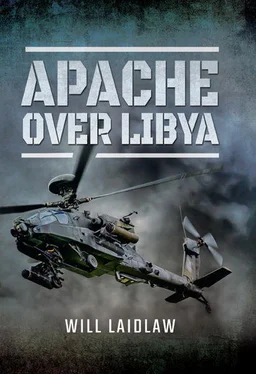Of course, the combat operator doesn’t get involved with political intent. The operator just wants to get on with it and do the work. The people who do care are the journalists and politicians, and people who want to be politicians, and the gossips in the pub. Journalists and politicians care greatly about how they beat one another with their respective versions of the truth, and soldiers’ comments are played with until the editor’s buzz-word bingo shapes a stick with which to beat the politician. Both sides are trying to sing louder, but the soldier in the middle just wants to get back to work.
Media speculation over Libya in May and June 2011 went like this: ‘stalemate, desperation, helicopters, escalation, they will crash, British airmen (they didn’t know we were soldiers) will die, NATO is failing’. Even Private Eye [4] Issue 1290, 10 June 2011
and those venerable military thinkers Richard Madeley and Judy Finnigan had an opinion. [5] ‘Gaddafi Makes Britain a Total Laughing Stock’, Daily Express , 30 July 2011
A former Ambassador to Libya, Oliver Miles, also lent the view of his ‘military friends’ saying this wasn’t a good idea. [6] ‘British, French Helicopters Attack Libyan Targets for FirstTime’, Washington Post , 4 June 2011
Of course, there was risk, and danger. Whatever the political motivation, London made big, brave decisions that put careers, and our lives, on the line. Our team knew the size of the task and its dangers. The journalists who came along with us got to appreciate it too. And they were as bored as we were with the Dettol-scrubbed official line. They wanted to see the story for real rather than the version we wanted to sell. And they were eager to get on and get their work done. They were bored. They did not come aboard to run up a tab in the wardroom and sit waiting on the quarterdeck while no one spoke to them. I didn’t like it either. They wanted interviews.
During the two-day passage to Libya I slowly, somewhat awkwardly, introduced myself during tea-drinking diversions on the quarterdeck: ‘I’m Will. Sorry it seems a bit boring. We’re quite busy. I need to get my plan straight and then we can talk perhaps.’ My best efforts at casual chat were staccato at best. I was very concerned at what was coming, all the known hell Gaddafi had ready, all the warning we had given him. I wondered what surprise we might have left on our side. I felt we were running out of time, that the whole thing was known and that we might cross the coast and be ripped up on the first night. I wrote a last letter to my wife and told Doug and Nick where to find it ‘if things unravel for me’.
Whatever my own private fears, my duty was to make the whole enterprise work. At the same time I had to let the media in. I got chatting on the quarterdeck more often. An agreement was struck: we would tell them on the day about an hour before the mission briefing and I would conduct TV and print interviews after the mission was over. This was good enough, but I also insisted on my anonymity, fearing having to explain myself to the wicked Colonel in some post-shoot-down prison.
As we steamed for Libya, Chris James flew to Poggio Renatico in Italy to join the planners in the CAOC. His journey wasn’t quite how he wished it would be. Having conducted the debrief of the final serial of the rehearsal exercise with me over the phone in the early hours of 29 May, a power cut meant he had to prise open the washing machine midcycle, liberate his uniform and pay a double fare to his taxi driver to get him to the airport on time. His connecting flight to London went to plan and he arrived in Bologna in time for lunch – except he missed lunch because he was the lonely figure standing in front of the empty luggage carousel in sandals, shorts, polo shirt and sunglasses, Wilbur Smith novel in hand, phone and credit card in pocket. He was looking forward to picking up a bag stuffed with wet, half-washed uniform, but it hadn’t made the journey. Instead, he had to make his way to the CAOC as he was, just arrived from Ayia Napa with two days of stubble. On arrival at the NATO nerve centre he was straight into a meeting with the three-star General running the operation! Two days later, his bag of stinking, wet, mouldy uniform arrived and his summer began.
He joined his old friend Jack Davis, who had deployed at 36 hours’ notice. Together their task was to get us missions that made sense, then shape them with their expertise. A mission, the target, the risk and the rules of engagement were always shaped in the planning, so that its final analysis, that last piece of dispassionate consideration, should be arrived at without issue. Our planning options were well shaped for us, first by the team in Poggio. Jack headed up the team and Chris was the Apache expert in a team of planners all well versed in how to use attack aviation. These were not just Army aviators; there were Royal Navy and Royal Air Force officers in the team, and it was their job to assist in integrating this fundamentally land-centric platform into an air campaign, but with the additional consideration of operating it from the sea. The new platform, the Apache, came with needs which would have to be coordinated with the other fifty strike sorties launched each day.
That process of integration and target selection would begin up to two days before a mission, and we would only be exposed to it in outline the day prior to launch and then again in detail on the afternoon of that evening’s mission. Our team in Poggio went through a ruthless process of negotiation, planning, targeting and legal discussion before handing off a mature enough plan to us at sea. On the day, they would be rushing about finalizing the legal context of the target, which would be confirmed as late as possible in order to preserve its validity. They would then wait until the mission had launched, struck and returned before discussing by phone what had happened and how this might influence subsequent missions. They had very long days, often frustrating, occasionally satisfying, unsung, unacknowledged and largely unrewarded. It taught me about how plans were made, how groups of people think and about the danger of not addressing preconceived ideas early. And there were plenty of those ideas doing the rounds in the minds of people who didn’t fly helicopters.
However difficult a group is to break into, you must have first-class thinkers from your team in the place where the plan is made. They are likely to have to break into a culture without the necessary time to do so naturally. They may have to overcome obstacles to grasping how the place works and to being understood how they work themselves. They are likely to find it difficult, perhaps unsatisfying. But they must be there if the plan is to have any chance of being fit for purpose and if the soldier flying in combat tonight is going to have a chance of doing so without coming unstuck. The team were constantly advising, at times cajoling, and occasionally explaining what is and what is not suitable for attack helicopters. Eventually, late in the afternoon on mission day, a target or, more usually, targets, would be confirmed and allocated to us.
When talk of bringing the Apache into the campaign became reality it brought with it more risk – risk to the lives of us flying soldiers, and reputational risk to the NATO air campaign, specifically the British contribution. The team in Poggio had the delicate balance of giving us enough freedom to get the task done with sufficient latitude to choose our own way both in planning and in the air, but also appropriate constraints to prevent us wandering away from the precision of the target selection and the protection allocated to our mission in the form of antienemy air defence aircraft and other offensive aircraft. Jets would have to be on hand at our most vulnerable times to somehow alleviate our danger.
Читать дальше












